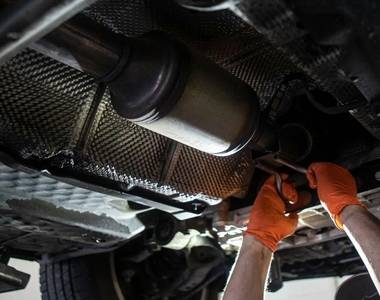If you're trying to get rid of your car, you're almost certainly wondering whether to sell it to someone privately or trade it in for a new one. That decision depends on how much time you want to spend selling it and your plans for getting a new one.

Explore the pros and cons of selling your car privately vs. trading it in the UK. Discover how you can maximize returns while minimizing potential challenges.
Should You Trade in Your Car or Sell it Privately?

(Source)
Trade-ins are great. They're like getting a free or discounted new car!
But they definitely aren't for everyone. When you sell your car to a dealership, they will probably give you far less than if you sold it yourself. They're factoring in the cost of reconditioning the vehicle and reselling it for a profit. The same goes for trade-ins.
If you decide to sell your car privately, keep in mind that you'll need to invest more time and effort into the process. You'll need to advertise, answer inquiries about the car and possibly deal with negotiations and paperwork.
But if you're willing to put in the work, private sales can be more profitable than trading in your vehicle (especially if your car is still in good condition).
There are plenty of additional variables to consider, though. In this article, we'll break them all down to help you make the right decision.
Trade-Ins vs. Private Sales: A Brief Overview
Trade-ins and private car sales are two completely different ways to sell your car.
A trade-in — also referred to as a part-exchange — means exchanging your car for a new one. When you do this, the dealership takes your current vehicle off your hands and applies a credit toward the purchase price of your new car.
When you sell a car privately, you're finding an interested buyer and working with them directly. This process involves a lot more work than a trade-in, as you'll need to list your car online, take photos and communicate with potential buyers.
You'll also have to deal with paperwork and payment once you've found a buyer. This leaves you vulnerable to car selling scams if you aren't careful who you're dealing with.
Pros — Trading in Your Car

(Source)
Trading in your car is widely regarded as the easiest and most convenient way to get it off your hands. If you're happy with the dealer and car, getting a new vehicle from them simplifies everything.
Convenience and Simplicity
The biggest benefit to part-exchanging a car is the convenience. You'll get to take care of everything all at once and without having to do the legwork yourself.
It's also a terrific option if you're already planning to buy another car from that marque/dealer. Eliminating the cash payment element of the transaction means fewer hoops to jump through when replacing your old car with a new set of wheels.
Some Money Guaranteed
When you sell your car to a private buyer, there's always the risk of your listing sitting on the internet for months with no action.
Even if you're selling a damaged car (lightly damaged, that is), you're practically guaranteed some money for its trade-in value.
Potentially Lower Tax Liability (for Company Cars)
It's unlikely you'll sell a used car for more than you bought it for. But who are we to say with certainty? With the skyrocketing prices of second-hand cars, anything's possible.
Without a monetary transaction involved in the ownership transfer, your car continues to be a business expense. If you use it for business travel and claim this on your taxes and sell it for more than you bought it, you will have to pay Capital Gains Tax on the sale.
Again, this is unlikely. And your car's value probably won't appreciate enough to make a big deal out of it.
Either way, accounting for it and reporting it adds to the headache that is taxes. If you trade in your car, you'll have no problems at all.
Clear Value Exchange
The dealer appraises your car and knows they'll be able to sell it. They don't have to give you any money for it. And they'll still recoup some additional revenue on the next sale (your new car).
From a business standpoint, the math of a trade-in or part-exchange is a whole lot easier to figure out than a buy-back. On the books, it's easier to account for.
It's also in the dealer's best interest to move cars off the forecourt and into a new owner's possession as quickly as possible.
For you, trading in a car means you'll get some money off your new vehicle. The amount varies depending on the condition of your old car, its age and mileage. Since the dealer doesn't have to pay you out and can simply transfer credit from one asset to another, they'll usually give you more on the credit transaction (mathematically speaking).
They know you're driving something off their forecourt and replacing it immediately. You know you're getting a good deal. A win-win.
Hassle-Free Transaction
A trade-in eliminates an extra step, making the whole process go smoother and more quickly. You won't have to worry about whether or not you've sent in all the paperwork correctly or if the buyer will back out at the last minute.
You also don't need to worry about making a mistake yourself (which you very well might — you aren't an expert in auto sales). Dealerships handle transactions like yours multiple times every day. They've got the process down.
Another benefit to working with a dealer is they'll notify the DVLA on your behalf. Once you're all set with your new ride, your legal obligations are already fulfilled.
Cons — Trading in Your Car
Trading your car is also not the best way to sell your car and get the most for it. You'll have to consider the following disadvantages to decide if you want to part-exchange or look for a private buyer.
Lower Value for Your Car
We don't doubt your dealer wants to help you. But they're in the business of making money. They will most likely give you the wholesale value of your car (or close to it).
That's why you should treat a trade-in credit like the money it is. It's more than just an exchange value - it's a cash transaction.
Your dealer has to make sure they don't take a loss on any vehicle. Consequently, you'll get less for yours than you might if you sold it privately and returned to the dealer to buy a new car.
Limited Negotiation Power
If you have a newer car the dealer knows they can sell quickly and it's in excellent condition, your dealer might budge a little. But they process too many transactions to make room for bargaining.
Some dealers will match their offer to other dealers'. For this reason, it's occasionally beneficial to try to part-exchange at multiple dealerships and compare offers. Other than that, you don't have much wiggle room when it comes to trade value.
Possibility of Being Upside Down on Your Loan Value
No matter how great a condition your car is in, it will have depreciated since you bought it. Even with increasing demand on the secondary market, you will likely have to take a hit.
If you owe more on your car loan than what the dealer is willing to give you for it, you're responsible for making up the difference out of pocket. To find out if that's the case, compare your car's current market value with your loan balance before deciding how to proceed.
Inflated New Car Price
Your dealer may try to make up for the potential loss on your trade-in by asking you pay more than sticker price for a new car. The negotiation power car buyers have when they walk onto the forecourt diminishes when they're trading in a car.
To get the best price for a new car, we recommend going through the sale and negotiation process beforehand. Once you and the dealer agree on a price, you can let them know you plan to trade in your old vehicle for the new one.
Negative Impact on Your Credit Score
If you sell a car that still has financing on it, you need to pay off the entire loan before trading it in. The lending company will report the payments and you will no longer be responsible for the car.
The issue is primarily with the new car you plan to purchase. Should you decide to finance the vehicle again, they will run another hard enquiry on your credit. This can have a negative impact, dropping your score by several points.
Pros — Selling Your Car Privately

(Source)
Turning to the private market opens up numerous additional options, no matter your situation. You can sell a non-running car, part it out, auction it off or find a collector to swoop it up for the right price. You can even sell a salvage car.
Higher Selling Price
Rather than taking the dealer's near-wholesale offer, you can list your car according to its fair market value. Since nobody's on the other end considering their profit margin, you're free to ask as much as you want for it.
You could even get strategic with your offer, slightly undercutting the dealer. You will still get a higher return than you would selling to them directly, and you can entice more potential buyers.
For a car that's in immaculate condition and has low miles, you could be sitting on thousands of dollars in savings. You just need to know how to market your listing to the right audience.
Negotiation Control
You call the shots when you sell on the private market. Of course, you have to be realistic when pricing your car for sale. But you can haggle and work with multiple buyers until you find a price you're happy with.
You can also raise the price if you find that people are willing to pay more for your vehicle. Your ability to negotiate will be limited only by the current market demand for cars like yours.
Multiple Offers Come to You
When you list a car yourself, you'll attract buyers to your listing. All you have to do is leave your email and WhatsApp number, and you'll start seeing interested buyers in your inbox.
You can receive multiple trade-in offers, but it would require you to drive around to dealerships all over town. That's a waste of time and money compared to potential buyers flooding your inbox on the daily.
Cons — Selling Your Car Privately
Hard work could potentially pay off handsomely when you sell your car privately. But there are some risks and responsibilities to consider before you move forward.
Time-Consuming and Effort-Intensive
Perhaps the biggest drawback to selling your car to a private buyer is the time and labour involved.
You have to:
- Do tons of research to understand what price you should ask for your car
- Prepare your car for sale and manage repairs
- Handle pre-sale inspections and ensure you have a valid MOT certificate
- Take pictures of your car for ads and online listings
- Create a detailed sales listing
- Respond to enquiries over email and WhatsApp
- Show multiple interested buyers the car in person
- Follow up with each buyer individually to keep them informed
- Negotiate multiple offers until you find the one that's right
- Create a contract and bill of sale
- Ensure your safety (financially and otherwise) during the transaction
- Tell the DVLA you've sold your car
If you forget an essential part of the process or make a mistake, the only person it costs is you. Cars that don't sell within a few weeks see a negative return on the time and effort invested in the private sale process.
Security and Trust Issues
When you're dealing with someone you don't know, there's always a risk of getting scammed or taken advantage of.
If you accept a bank transfer, you will have to wait several days for it to go through before finishing the sale. Your buyer probably won't have thousands of pounds in cash sitting around, so this is your most likely payment option.
For those who do want to buy a car for cash, they might be using counterfeit bills. You will have to complete the transaction at a bank or credit union, where they can verify the legitimacy of the payment on the spot.
Handling Paperwork
Dealing with paperwork can be a huge annoyance, particularly if you're unfamiliar with how it's done. There are plenty of templates on the internet, but you'll have to make sure you get the right forms for your car.
Aside from the regular documents you need to sell your car, you will also have to prepare the following:
- An itemised bill of sale
- A signed registration transfer form
- A second copy of everything for your records
- The green slip (V5C/2) from your V5C logbook
If any part of the paperwork is incorrect or incomplete, it will delay the transaction and complicate things with your buyer.
Negotiations are Difficult
For many, negotiations are a balancing act. Unless you're an auto trader, you probably don't know the true value of what you have. The market still decides that.
This challenge worsens if you find yourself dealing with a highly educated buyer. They have the upper hand if they know more about your car than you.
In addition to preparing your car and managing your listing, you'll need to spend plenty of time understanding market dynamics if you want to secure the best price. You won't negotiate confidently if you don't know enough.
Dealing with Potential Buyers
Aside from potential scams, negotiating and taking care of all the paperwork yourself, managing multiple buyers is just plan tiresome. The more available you are, the faster you'll get the car off your hands.
Everyone has a life. Selling your car quickly means sacrificing yours to make yourself available for anyone and everyone who's seriously interested.
When scheduling conflicts with work, family and friends arise, it puts your sale at risk. It might be difficult to allocate time for this process — especially with a full-time job or school.
Tax Benefits of Trading in Your Car
In the UK, regular vehicle sales are not subject to Capital Gains Tax. They're considered 'wasting assets'. As such, you can even sell a classic car for a major profit without any tax liability.
As for road tax, it's based on emissions. So whether you trade it in for a car at the dealer or sell it privately, you'll still need to pay whatever the emissions rate of your new vehicle is. If you buy from a licensed and authorised dealer, the emissions may be better (or, at the very least, more accurate) than buying privately, so yearly road tax might cost less.
But when you trade in a car, your total purchase price of the new vehicle can be lowered by its value, meaning you will pay lower VAT tax (if your dealer handles VAT on second-hand cars).
This is most beneficial for those looking to buy an expensive new car. 20% VAT adds up, so they could experience considerable tax savings.
If you're selling a company car, there are potential tax benefits to trading it. If your car is worth more than your business bought it for, you'll have to pay Capital Gains Tax since it's a business investment. With a trade-in, you won't have to pay anything.
So... Is it better to trade in or sell your car?
The benefits of trading in a car vs. selling it are entirely subjective. Here's a brief rundown of everything we discussed above.
Trade in your car if...
- your main priority is getting rid of the car quickly.
- you care a lot about security and safety in your sale.
- you are happy with the dealer and plan to buy another car from them.
- you want to guarantee some money from the transaction.
- you don't know much about the auto trade and don't feel like learning.
- you're too busy to manage multiple listings and buyers (or you know you'll forget).
- you are a business owner who claims the car as an expense.
Sell your car privately if...
- your main goal is to make as much from the sale as possible.
- you're well-versed in car market dynamics and know what your car is worth.
- you already have a network of potential buyers.
- you're willing and able to deal with the work involved in a private sale.
- you are prepared to potentially deal with fraudulent buyers.
- the car you are selling is in unsatisfactory condition and you need additional options.
- your car is unique, modified or appeals to a niche market in some other way.
Making the Decision
In truth, the decision is completely up to you.
You could trade in your car and be on to the next one quickly. Or, you could sell it privately and make some extra money while also learning a bit about the process.
If you do decide to sell your car privately, make sure to adequately protect yourself and your vehicle from any potential harm. Keep your car insurance to cover the sale process. Use caution when meeting with unknown people. Have someone accompany you for added safety, and you shouldn’t have too much to worry about.
If you choose to part-exchange it at the dealer, decide whether you're happy to leave money on the table in the name of convenience and security.
Wrapping Up
Your decision to trade or sell your car should be based on what best suits you and your lifestyle.
For most of us, it's better to just trade it in for a new car and be done with it. But if you're willing to devote time and energy to the process, selling your car privately can yield great rewards — both financially and educationally.
Whichever option you choose, make sure you handle all the paperwork and procedures correctly to avoid unwelcome surprises down the line.










